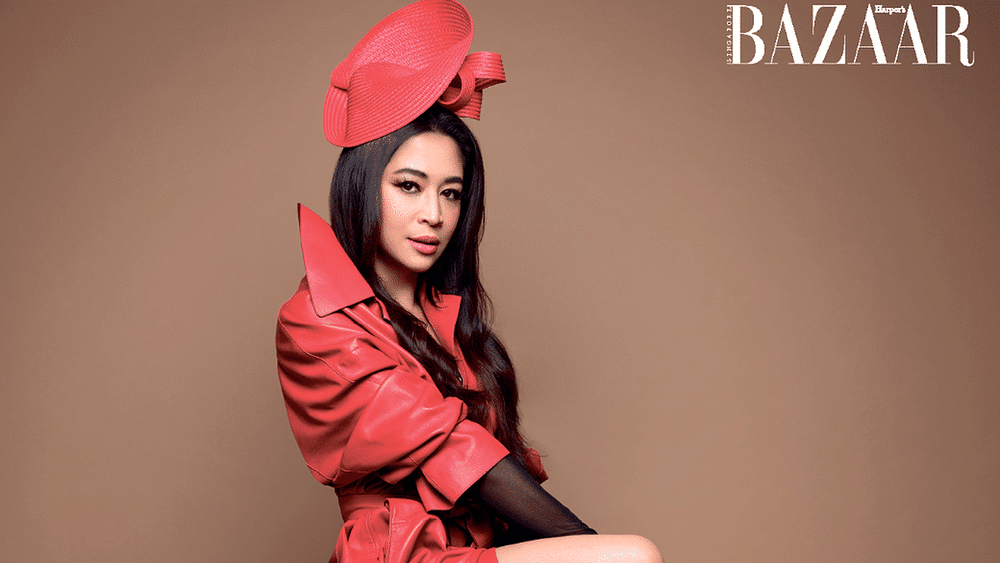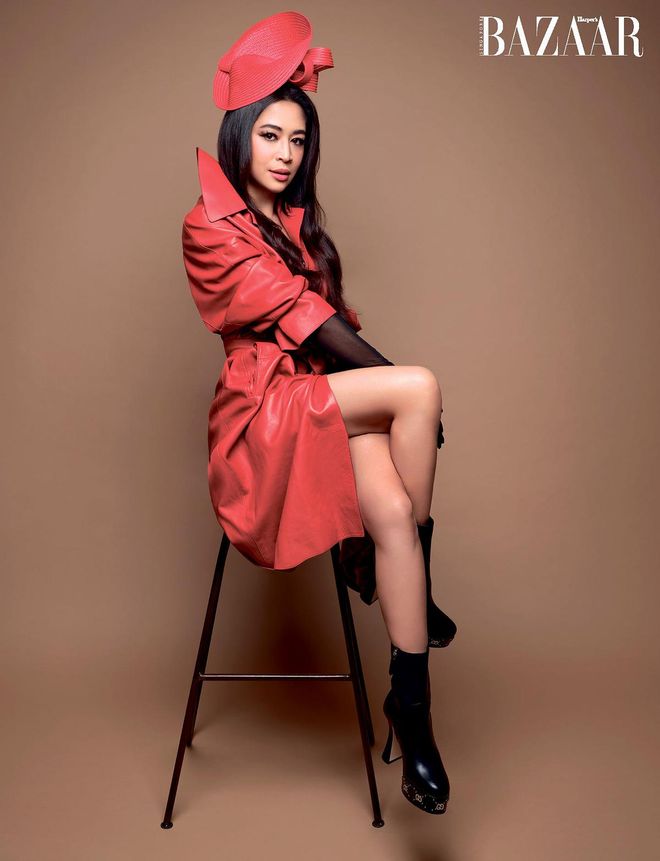BAZAAR Power List 2023: Munah Bagharib
Though she has almost 100,000 followers on Instagram today, fame is not the reason why she does it.


Coat, Tod’s. Headpiece, Eskapade. Boots, Gucci. Gloves, stylist’s own.
Munah Bagharib
This year, we celebrate Singapore’s comedy queens and funny girls who have captured our hearts, tickled our ribs and got us thinking and reflecting on ourselves and society at large. Whether it’s through stand-up, sketches, or film, these funny girls have the courage, flair and smarts to not only succeed in the world of comedy, but to also thrive in it. Meet Munah Bagharib, a 35-year-old actor, host and content creator.
When did you first discover that you had the gift of making someone laugh and what did you do with that discovery? Do you have an early memory to share?
Actually, I've always loved performing, but in all honesty, I didn't think it would be a career that I pursued and I sort of fell into it. Like I was already working at a network and I was doing production, but at the same time, there were these calls for auditions, and I thought, 'Oh, why not try?'
Related article: Exclusive! We Talk To The Singaporean Model Who Just Walked Gucci’s FW18 Show
And I took the leap. I got the call for the show that I auditioned for and then the rest is history. I thought okay, maybe there's something I want to try and focus on, which is what I did. It was risky because with my family, they didn't quite understand me going to this path of entertainment because it's always seen as not the most stable. But I felt like this is what I was meant to do because my passion is there, and you know I had the drive to just want to try it out.
Comedy is powerful because...
The power of comedy, to give people a light, fun entry point to a bigger message - and to make people think.
What are the challenges in making comedy a career, and in that sense, treating it as a business?
I think that's always a struggle because when I first started, I just knew that this cannot be a viable career. Or, that's what I grew up with, and going into the industry, I understood that. There's so much of your time that goes into it, but yet it's not really compensated. And especially speaking to other artists from other regions, it's just different. I don't know where it starts from, but I do feel like I've also worked with people, companies, organisations in Singapore where they do recognise your efforts, and they appreciate it. And it feels good, too. To just work with people who love your work, love what you do and want you for you. And also treat you fairly. But I have been quite lucky to encounter these people. And it just makes you want to do more for them, too. It's a good two-way relationship to have.
Is there anything you won’t joke about?
I think when I first started out, especially with social media, you don't know what the boundaries are. You're just doing it and it's such a new platform and medium, and that's the same with comedy, too. You never know how people are gonna take it. But I think what I found is that if you have a message that you wanna put out, and if you wanna craft it a certain way, you need to still be sensitive or aware about how people might take it. Of course I've had experiences in putting something out and it's just like, ah, that's not what I meant. So I've learned that doing proper research or even having a focus group or focus friends. I would call them to just check, does this sound okay? That helps a lot.
Who or what makes you laugh?
Aiya, I think as I grow older, it gets worse and worse. Like what dad jokes am I laughing at? No, but as I grow older I have more ability to find joy in hardships. And I think that's how it has evolved. Now everything is funny. I don't know whether it's a good thing or not, but I'm always able to laugh. Being able to laugh at yourself. But other than that, I laugh at very stupid things nowadays.
What does power look like to you?
Power to me is the ability to collaborate and empower other people, and to choose to be kind. When I see those qualities in people, I'm like, yeah, these are the people I aspire to be, and these are the people I respect. Because when you're powerful, there's so much that could happen for you, right? But for you to still be grounded, I think that's very important, and that's a good quality to have.
In what mode do you feel most powerful?
I think when I'm performing, it's a cliché. When I'm on stage, let's say like, with a fellow actor or fellow comedian, there's that collaboration and there's just that synergy together. And at the same time, with the audience as well, it feels so warm and fuzzy and you're so connected. That's why I love live performances the most. Because you connect with people, and making connections makes me feel powerful.
What’s one thing you would change about your industry?
I would hope that people get rewarded or recognition for what they do - a lot more. And get the fees they deserve. Because in Singapore, with the entertainment industry, it is small, compared to other regions. But I feel like there's so many artists here who do good things, and they're so passionate and they're pushing boundaries, and these people deserve that recognition, deserve that platform.
Related article: Singaporean Star Designer Jon Max Goh On Staying Local And Finding Success Abroad
What’s the most fulfilling thing about what you do?
I think the most fulfilling thing that I've found is that I can connect with people through performing, through comedy. It's a crazy thing, because when I started doing it, I did it because I wanted to write, because I love it. But when people start coming to you and telling you, okay, you know, your work has helped me through certain things, or it has gotten me through a difficult point, you think like, oh, there's so much more to just making jokes than what I thought. I think that's very special, to be able to affect people in good ways.
Can you share more about a time when humour helped you get through something difficult?
Sometime last year, I found myself in a position where I went through a loss that I couldn't wrap my head around. And I'm not very good with dealing with grief and loss. I think for a whole week, I kept to myself and I didn't really interact or reach out, because I just didn't know what to do. I was lost, but then a friend came over one night and he was like, enough is enough. We need to you talk about what you're going through and what you're dealing with. He made a passing comment, just a little joke, and I laughed for the first time in a week. I don't know how to explain to you, but it's that feeling where you suddenly laugh because you're actually genuinely finding something funny, and you're not trying to force yourself to laugh. It just felt like something was taken away from me and I really needed that. And I think that's why humour is powerful, because even in times of darkness, that moment when you smile or you laugh, it just takes something away.
The biggest misconception about my job is...
That it's fun. That it's easy. You think you know, but you have no idea. No, I think the biggest misconception is that it's not as serious, it's temporary. I thought that too when I first started out. I thought, this is just gonna be for a while. Like a year. But it is something that can be a career, and it is something that if you're really passionate about, you can push further, you can make changes with. So yes, it is a very serious job.
Related article: Singaporean Director He Shuming Reflects On Life After ‘Ajoomma’
This interview has been edited and condensed for clarity.
Photographed by Wee Khim
Creative direction and styling by Windy Aulia
Producers: Cindy Ow, Navin Pillay
Makeup: Fiona B
Hair: Eri Su
Stylist’s assistants: Naysa Pradhan, Zoe Tauro